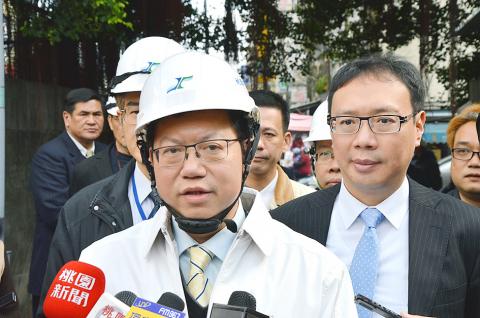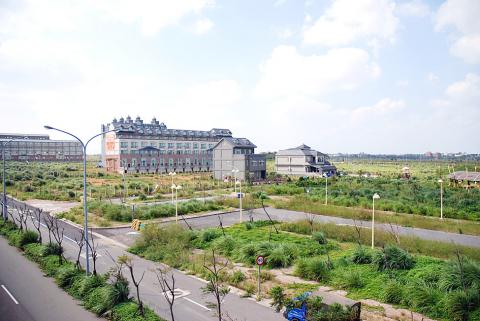Amid allegations of misuse of public funds and illegally favoring specific groups, Taoyuan Mayor Cheng Wen-tsan (鄭文燦) yesterday said he would hand over all information relating to the Taoyuan Aerotropolis project to the Ministry of Justice’s Agency Against Corruption (AAC) for investigation.
“The city’s new administration team has simplified and limited the operations of the Taoyuan Aerotropolis Corp (桃園航空城公司) to investment promotion and marketing only,” Cheng said in a Facebook post. “All jobs and duties that should be under the city government’s control will be returned to the city and handled by its bureaus. It would be a return to the normal process of policy execution and allow the project to be supervised publicly by elected representatives on the city council.”
Cheng said he had asked Deputy Mayor Chiu Tai-san (邱太三) to set up a task force composed of different local government bureaus — including budget, accounting and statistics, finance, economic development and civil service ethics — to oversee the special investigation of the aerotropolis firm.

Photo: Hsieh Wu-hsiung, Taipei Times
Project documents will first be organized and reviewed by the task force before they are forwarded to the AAC for investigation, Cheng said.
“Only when Taoyuan has the courage to correct previous mistakes can it march forward into a new beginning,” he said.
Asked whether the move would mean suspending or mothballing the project completely, Chiu answered in the negative.

Photo: Huang Yi-pi, Taipei Times
“The project consists of many parts and only those found to be problematic will be investigated and halted,” he said.
To address questions about the project’s opaque operations and functions, Chiu said: “It will be carried out according to five major principles, as the mayor has insisted: transparency, democratic participation, green economics, public interest and industry investment.”
“The corporation’s operation will be restricted to what was originally called for. That would place the rest of the business, including land appropriation, back in the hands of the city government so it can be publicly overseen by the city council,” he added.
The Taiwan Association for Human Rights welcomed the mayor’s action, and said it hoped the mayor would live up to the promise he made during his election campaign that he would place the whole project under investigation, especially in regards to “allegations of land speculation and insider trading even before the project had taken shape.”
Chiu said the city government welcomes any person or group to file complaints about what they consider illicit or to take legal action against suspected corruption.
Chien Chien-jung (錢建榮), a Taoyuan District Court judge who has long questioned the project’s necessity, criticized Cheng on Tuesday, saying that the mayor’s comment on “rebuilding the project from scratch after completely demolishing it” was nothing but “empty words.”
Calling for a “demolition and nothing more,” Chien wrote in a letter published by a local publication that neither Taoyuan nor Taiwan needs such a project, which has from the outset been synonymous with land speculation and collusion between government officials and the business sector.
“Mayor Cheng should easily see it now with the internal information available to him,” he added.
The city government released a statement on the same day rebutting Chien’s accusation that what Cheng has done is simply to “have a different group of people lining their pockets” with the project.
“The mayor has prohibited all first-level city officials and members of the core team, including himself, from purchasing land other than that for primary residence,” the statement said, adding that execution of the project would now be in the hands of the city government and thus be properly supervised.

PREPAREDNESS: Given the difficulty of importing ammunition during wartime, the Ministry of National Defense said it would prioritize ‘coproduction’ partnerships A newly formed unit of the Marine Corps tasked with land-based security operations has recently replaced its aging, domestically produced rifles with more advanced, US-made M4A1 rifles, a source said yesterday. The unnamed source familiar with the matter said the First Security Battalion of the Marine Corps’ Air Defense and Base Guard Group has replaced its older T65K2 rifles, which have been in service since the late 1980s, with the newly received M4A1s. The source did not say exactly when the upgrade took place or how many M4A1s were issued to the battalion. The confirmation came after Chinese-language media reported

A Ministry of Foreign Affairs official yesterday said that a delegation that visited China for an APEC meeting did not receive any kind of treatment that downgraded Taiwan’s sovereignty. Department of International Organizations Director-General Jonathan Sun (孫儉元) said that he and a group of ministry officials visited Shenzhen, China, to attend the APEC Informal Senior Officials’ Meeting last month. The trip went “smoothly and safely” for all Taiwanese delegates, as the Chinese side arranged the trip in accordance with long-standing practices, Sun said at the ministry’s weekly briefing. The Taiwanese group did not encounter any political suppression, he said. Sun made the remarks when

The Taiwanese passport ranked 33rd in a global listing of passports by convenience this month, rising three places from last month’s ranking, but matching its position in January last year. The Henley Passport Index, an international ranking of passports by the number of designations its holder can travel to without a visa, showed that the Taiwan passport enables holders to travel to 139 countries and territories without a visa. Singapore’s passport was ranked the most powerful with visa-free access to 192 destinations out of 227, according to the index published on Tuesday by UK-based migration investment consultancy firm Henley and Partners. Japan’s and

BROAD AGREEMENT: The two are nearing a trade deal to reduce Taiwan’s tariff to 15% and a commitment for TSMC to build five more fabs, a ‘New York Times’ report said Taiwan and the US have reached a broad consensus on a trade deal, the Executive Yuan’s Office of Trade Negotiations said yesterday, after a report said that Washington is set to reduce Taiwan’s tariff rate to 15 percent. The New York Times on Monday reported that the two nations are nearing a trade deal to reduce Taiwan’s tariff rate to 15 percent and commit Taiwan Semiconductor Manufacturing Co (TSMC, 台積電) to building at least five more facilities in the US. “The agreement, which has been under negotiation for months, is being legally scrubbed and could be announced this month,” the paper said,